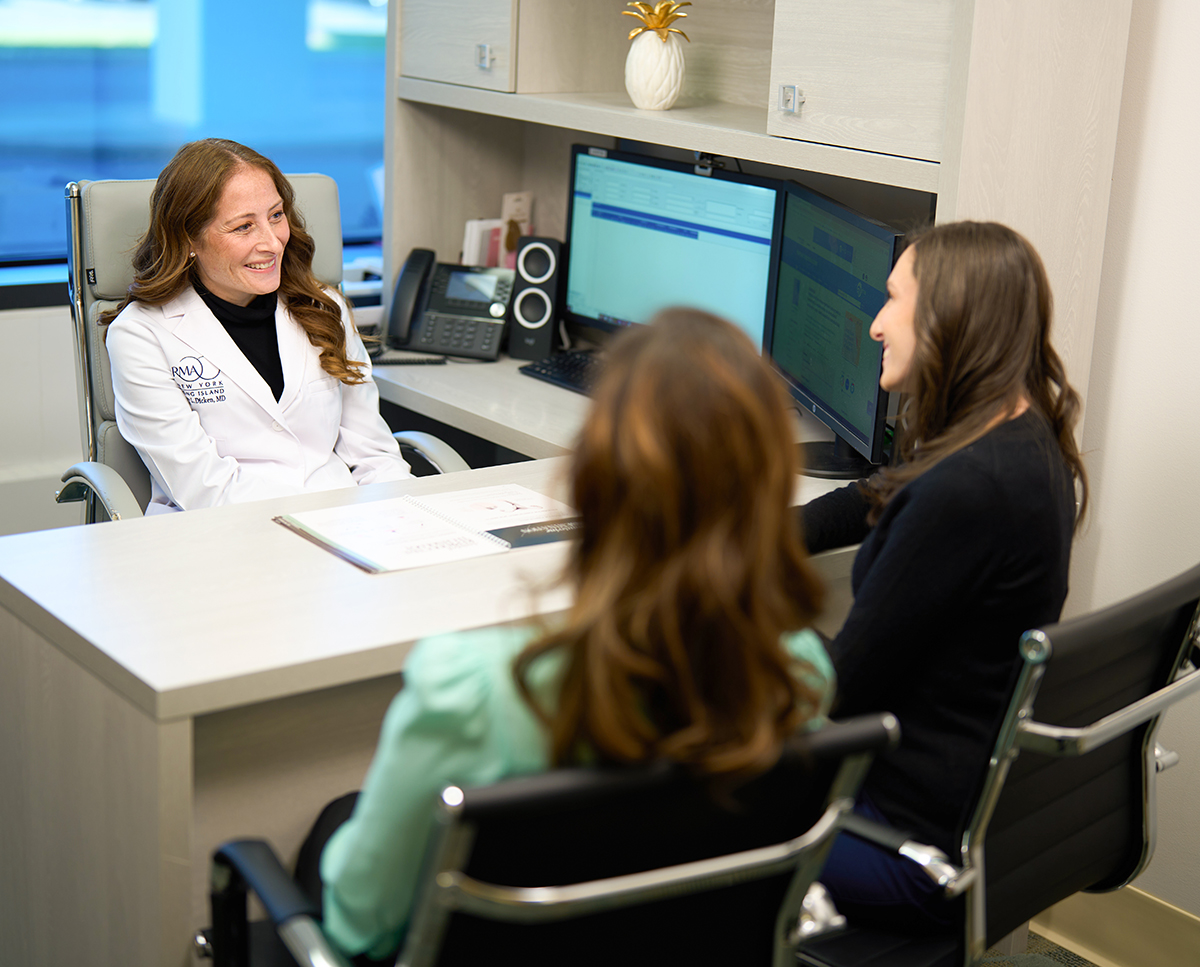LGBTQ+ Family-Building on Long Island

Since 1988, RMA of New York – Long Island has provided fertility patients throughout Nassau and Suffolk Counties with advanced, high-level fertility care. Our unique approach to LGBTQ+ fertility and family-building care is firmly rooted in creating an individualized experience for each patient, using the safest and most effective technologies available, all with the convenience of being a local, neighborhood practice.
When you walk into one of our fertility clinics, you can expect to work with a compassionate team that is dedicated to guiding you along your family-building path. Your fertility care and family-building plan will be custom-tailored to meet your specific needs by our team of expert fertility physicians. Learn more about different treatment options below, and tune into a webinar with Dr. Cary Dicken for a full breakdown.
Family-Building Options for Lesbian Couples and Individuals
Lesbian couples and individuals typically achieve pregnancy with the assistance of donor sperm, and either intrauterine insemination (IUI), in vitro fertilization (IVF), or reciprocal IVF.
Intrauterine insemination (IUI)
IUI is often the primary method of conception for individuals who are not experiencing fertility challenges. During ovulation, donor sperm is thawed and “washed” and placed directly into the uterus. With IUI, you have the option of choosing a natural cycle without medications or a medicated cycle in which medications, such as Clomid, are used to induce or augment ovulation.
In Vitro Fertilization (IVF)
In IVF, the patient whose eggs are being used to create the baby will receive hormonal injections, bloodwork, and ultrasound monitoring over a period of time to produce multiple eggs. When a number of eggs have matured, the eggs are retrieved by the reproductive endocrinologist and combined with the donor sperm in our IVF laboratory by one of our highly-trained embryologists. A healthy embryo will be transferred back into the patient’s uterus for implantation and pregnancy.
Reciprocal IVF
Reciprocal IVF is an exciting process that allows both female partners to be involved in the conception of their baby. In reciprocal IVF, the eggs from one partner are fertilized with donor sperm, and the resulting embryo(s) are transferred to the other partner’s uterus who will then carry the pregnancy and give birth. This makes it possible for one partner to be the genetic parent and for the other partner to carry the baby.
Family-Building Options for Gay Men
A successful treatment cycle for gay male couples and LGBTQ+ men depends on several factors, including the health and fertility of the patient(s), egg donor, and gestational surrogate, as well as the expertise of the fertility specialist and IVF laboratory. As a first step, scheduling a semen analysis to have your sperm evaluated is highly recommended in order to rule out any medical issues or male-factor infertility. Having your sperm evaluated can sometimes influence which partner will be genetically involved in the IVF process. Our wide range of fertility care services include:
In Vitro Fertilization (IVF)
IVF is the leading standard of care for LGBTQ+ family-building; it involves combining sperm with donor eggs in an IVF laboratory setting to create one or multiple embryos. A healthy embryo is then transferred to the uterus of a gestational surrogate for implantation. The sperm used in IVF can come from either or both partners, or a donor if needed. Learn More
Split Cycle for Two Sperm Providers
If both you and your partner wish to be genetic parents, RMA of New York – Long Island offers what’s known as a split IVF cycle. Instead of using sperm from only one partner, your collection of donor eggs is divided into two groups; one group of eggs is fertilized using your sperm, while the other is fertilized using your partner’s sperm.
Egg Donation for Gay Male Couples and LGBTQ+ Men
Gay male couples and LGBTQ+ men typically need eggs from an egg donor in order to conceive. Some aspiring parents choose to ask a friend or relative to be their egg donor, while others choose an anonymous donor from our database of pre-screened candidates, while others choose to use an egg donor bank or agency. The egg donor undergoes ovarian stimulation to produce multiple eggs. The eggs are retrieved and mixed with sperm from the intended father. A healthy embryo is then transferred into the uterus of a gestational surrogate. Learn More
Gestational Surrogacy for Gay Male Couples and LGBTQ+ Men
A gestational surrogate is someone with a uterus who carries a pregnancy and delivers a baby for someone else. A gestational surrogate does not share a maternal genetic connection with the baby she carries. While some patients ask someone that they know to be their surrogate, most find their surrogate through an agency. The third-party reproduction team at RMA of New York – Long Island can help you connect with an accredited surrogacy agency. We will also manage all medical aspects of the treatment cycle process, including eligibility screening.
Family-Building Options for Transgender and Gender-Diverse Families
There is a wide range of fertility care options available to gender-diverse patients who are transgender, non-binary, or gender-nonconforming. Some of these options include IVF, egg donation, sperm donation, and surrogacy. Fertility preservation may also be initiated prior to or alongside gender-affirming treatment and/or surgery. Learn about the steps and treatments available for transgender fertility preservation and family-building.
As a first step, we recommend a consultation with one of our reproductive endocrinologists so that we can work together to create a fertility care plan that includes the assisted reproductive technology necessary to complete your journey based on your individual needs.
